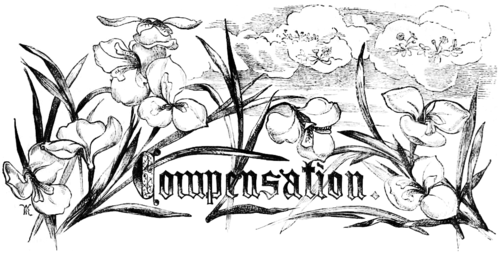Once a Week (magazine)/Series 1/Volume 5/Compensation
“Have you daisies in Tasmania?”—English Letter.
No, dear—on neither lawn nor hill,
Nor in our forest mazes,
Dwell those child-loved flowers of home
Your bright-eyed English daisies.
I used to wish my babes could play
About your grass-plot mossy,
With king-cups strewn upon their hair,
As golden and as glossy:—
Or sit beneath your trellised bower
Where the roses bloomed so early,
Weaving long strings of daisy chains,
Gold-boss’d, pink-tipp’d, and pearly.
I vainly craved that they should feel
Your fond and warm caressing,
And share the love that thro’ long years
To me brought priceless blessing.
Oft have I counted o’er my lost,
With tears of wistful sorrow;
And, full as oft, new happiness
Brought smiles upon the morrow.
Now, ’tis my Faith, for one denied,
Another boon is given;
If we have fewer stars on Earth
We have a brighter Heaven.
For daisies we have lilies[1] sweet,
And, for the city’s riot,
The silence of untrodden hills,
Folded in sunny quiet.
Near one (now long-left) sea-side home,
I lovingly remember
The glorious wealth of lily-blooms
In summer-crown’d December.
And still, their perfume (like the mists
Of fragrant incense, stealing
Around a wizard’s mirror’d scene,
Distance, or death revealing)
Shows softly to my memory, how
One summer-eve, we rambled
Along the beach, and o’er the cliffs,
And how the children scrambled!
And where we sat upon the rocks,
While the drowsy air was bringing
Adown the shady inland slopes
The she-oat’s plaintive singing.
The blue, bird-dotted sea, asleep,
Murmur’d its dream-thoughts inly;
And on its ever-heaving breast
Cloud-shadows lay serenely.
Three sister-islets in the bay
With lichens many-tinted
(Like painter’s palette freshly sot),
In sunset splendour glinted.
Five silv’ry lights were on the sea,
’Twixt shore and islets floating:—
“An argosy from fairy land!—
Titania, out a boating!
“The white sails flap, and furl away—
The prows are like old galleys—
“All imaged in the glassy deep
That softly round them dallies.”
Ah! see—while we with idle dreams
People the scene entrancing,
Five pelicans are rising, where
The mullet-shoal is glancing!
With grey and silver plumes up-borne,
And well-provisioued pouches,
Our stately neighbours wing their way
Off, to their beach laid couches.
“Now, children—home! The sun has set,
The evening breeze is chilly:—
Alas! I fear you have not left
A single summer-lily!
They laugh, and point:—I cannot miss
(So bountiful the treasures)
The many handsful that have gone
To yield the evening’s pleasures.
Still, constellated thickly, gleam
The lilies, sweet and shining:—
Still, tho’ of some bereft, our lives
Have blessings past divining!
No! we’ve no “daisies-pied” to pluck,
No cowslips, to make wine of!
We see not e’en the blessed stars
Our childhood loved the shine of.
I yearn for distant dear ones here,
For old-world art and beauty:—
But guardians twain still cheer my heart,
God’s love—and Woman’s duty.
That, sheddeth mercies o’er our path,
How far beyond deserving!
This, bindeth with content, the thoughts
Too prone to errant swerving.
Be sure, for every bliss denied,
Some other good is given.
If we have not your stars of Earth,
We have a sunnier Heaven!
L. A. M.
- ↑ One of the most universal Tasmanian flowers is the native lily (Diplarrhena Morea). It especially frequents poor sandy soils, where the great tussocks of its long reedy leaves, and, in early summer, the abundance of its Iris-shaped, fragrant, silvery-white blossoms form a distinct feature in the monotonous bush landscape.

